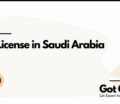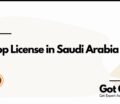
Starting a dairy products shop in Saudi Arabia presents tremendous opportunities, especially with the Saudi Arabia dairy products market value expected to grow at a CAGR of 3.8% between 2024 and 2032. Whether you’re planning to open a dairy store in Riyadh, Jeddah, Dammam, or any other Saudi city, understanding the licensing requirements is crucial for your business success.
This comprehensive guide covers everything you need to know about obtaining a dairy products shop license in Saudi Arabia, from SFDA registration to municipal permits and commercial licensing requirements.
Understanding Dairy Products Shop Licensing in Saudi Arabia
The dairy products retail business in Saudi Arabia is regulated by multiple authorities to ensure food safety, quality standards, and consumer protection. The primary regulatory bodies include the Saudi Food and Drug Authority (SFDA), Ministry of Municipal and Rural Affairs, and local municipalities.
The Local Food Establishments Registration and Licensing System is an electronic system which aims at building-up a database for all food establishments in the Kingdom of Saudi Arabia, making the process more streamlined and transparent for dairy shop owners.
Key Licensing Requirements for Dairy Products Shops
Opening a dairy products shop in Saudi Arabia requires multiple licenses and permits from various regulatory authorities. Understanding these requirements is essential for successful business establishment and ongoing operations. The licensing framework ensures food safety, consumer protection, and compliance with Saudi commercial regulations while maintaining high standards across the dairy retail sector.
SFDA Registration and Food Establishment License
The Saudi Food and Drug Authority (SFDA) is the primary regulatory body for food establishments in the Kingdom. Dairy product manufacturers, including their related slaughterhouses and suppliers, are subject to registration and inspection, and this extends to retail establishments handling dairy products.
For dairy products shop owners, the SFDA requirements include:
Food Establishment Registration: All dairy shops must register with the SFDA through their electronic system. This registration creates a comprehensive database of food establishments across Saudi Arabia.
SFDA Warehouse License: The importer must have an account with the Saudi Food and Drug Authority (SFDA), and a valid SFDA Warehouse License if you’re importing dairy products for retail.
Product Registration: Each dairy product category you plan to sell must be registered with SFDA, ensuring compliance with Saudi food safety standards.
Commercial Registration and Business License Requirements
Beyond SFDA registration, dairy shop owners must obtain standard commercial licenses:
Commercial Registration (CR): This is the fundamental business license required for all commercial activities in Saudi Arabia. The Saudi shareholder must own at least 25% of the company’s shares for foreign investors, though premium residence holders have certain exemptions.
Municipal Business License: Local municipalities issue specific permits for food retail establishments, including dairy shops. Requirements vary by city, with major markets like Riyadh, Jeddah, and Dammam having specific regulations.
Trade License: Specific to dairy products retail, this license authorizes the sale of dairy products within designated areas.
Step-by-Step Process for Obtaining Dairy Shop License
The dairy shop licensing process in Saudi Arabia follows a structured approach involving multiple government agencies and regulatory bodies. Each step has specific requirements, timelines, and documentation needs that must be carefully followed to ensure successful license approval. Proper preparation and understanding of this process significantly reduces delays and increases approval chances.
Pre-Application Requirements and Documentation
Before starting your dairy products shop licensing process, ensure you have:
Business Plan and Financial Documentation: Certified financial statements from the previous fiscal year are required for the commercial registration process.
Location Compliance: Your shop location must meet specific requirements for dairy product storage, including proper refrigeration systems, ventilation, and accessibility for health inspections.
Import Documentation (if applicable): An original certificate of origin is required for exporting to Saudi Arabia. The certificate has to be legalized by the chamber of commerce of the exporting country.
SFDA Registration Process for Dairy Shops
The SFDA registration involves several critical steps:
Online Application Submission: All local foodstuff companies (Factories, stores and distribution centers) can register company data, attach all required documents through the SFDA electronic services portal.
Facility Inspection: SFDA conducts mandatory inspections of dairy retail establishments to ensure compliance with food safety standards.
Product Category Registration: Each type of dairy product you plan to sell must be registered separately with specific documentation.
Municipal and Local Authority Approvals
Each Saudi city has specific requirements for dairy shops:
Riyadh Dairy Shop Licensing: The Riyadh Municipality requires additional permits for refrigerated food retail, including specific zoning compliance and environmental assessments.
Jeddah Dairy Products Store Permits: Jeddah’s coastal location requires additional considerations for humidity control and product preservation standards.
Dammam and Eastern Province Requirements: The Eastern Province has specific regulations for dairy imports through its major ports, affecting supply chain documentation.
Food Safety and Quality Standards Compliance
Saudi Arabia maintains strict food safety standards for dairy products retail to protect consumer health and ensure product quality. Compliance with these standards is mandatory for all dairy shop operators and involves regular monitoring, documentation, and inspection protocols. Understanding these requirements is crucial for maintaining your operating license and avoiding regulatory penalties.
Saudi Food Safety Standards for Dairy Retailers
All food products, whether imported for commercial purposes, display, or for sampling, must be fit for human consumption and should meet established shelf-life requirements. This applies specifically to dairy products, which have strict temperature and storage requirements.
Temperature Control Systems: Dairy shops must maintain specific temperature ranges for different dairy products, with continuous monitoring and documentation requirements.
Shelf-Life Management: Proper rotation systems and expiration date monitoring are mandatory for all dairy products.
Labeling Requirements: All dairy products must comply with Saudi labeling standards, including Arabic translations and nutritional information.
Inspection and Compliance Monitoring
Regular inspections are conducted by SFDA and municipal authorities:
Monthly SFDA Inspections: Routine checks ensure ongoing compliance with food safety standards.
Municipal Health Inspections: Local health authorities conduct quarterly inspections focusing on facility cleanliness and storage conditions.
Customer Complaint Resolution: Established procedures for handling customer complaints and product recalls.
Import and Supply Chain Licensing
Dairy products shops in Saudi Arabia often require specialized import and supply chain licensing depending on their sourcing strategy. Whether importing directly from international suppliers or working with local distributors, specific permits and certifications are mandatory. These requirements ensure product traceability, quality control, and compliance with international trade regulations.
Importing Dairy Products for Retail
If your dairy shop imports products directly, additional licensing is required:
Import License: Specific permits for importing dairy products from approved countries and suppliers.
Foreign Establishment Registration: Registration of all Foreign Establishment exporting food stuff to the KSA, Local Saudi food Importer and custom brokers is mandatory.
Quality Certifications: Quality Certificates:ISO22000 and/or ISO9001 and/or GMP and/or HACCP are required for imported dairy products.
Local Dairy Product Distribution Licensing
For shops sourcing from local dairy producers:
Supplier Verification: All local dairy suppliers must be SFDA-registered and compliant.
Distribution Agreements: Formal agreements with local dairy producers must include quality assurance clauses.
Cold Chain Management: Proper refrigerated transportation and storage documentation.
Financial and Investment Requirements
Establishing a dairy products shop in Saudi Arabia requires substantial financial investment beyond basic licensing fees. Understanding the complete financial requirements helps entrepreneurs plan their budget effectively and secure adequate funding. These investments cover licensing costs, equipment, infrastructure, working capital, and ongoing operational expenses necessary for successful business operations.
Capital Requirements for Dairy Shop Licensing
Starting a dairy products shop in Saudi Arabia requires significant capital investment:
Initial Licensing Fees: SFDA registration, commercial registration, and municipal permits typically cost between SAR 15,000 to SAR 30,000.
Equipment and Infrastructure: Refrigeration systems, storage facilities, and compliance equipment can cost SAR 100,000 to SAR 500,000 depending on shop size.
Working Capital: Initial inventory and operational expenses require adequate financial backing, typically 6-12 months of operating expenses.
Insurance and Liability Requirements
Product Liability Insurance: Mandatory coverage for dairy products sold to consumers.
Property Insurance: Coverage for refrigeration equipment and inventory.
Business Interruption Insurance: Protection against losses due to equipment failure or regulatory issues.
Regional Variations and City-Specific Requirements
Different Saudi cities and regions have unique licensing requirements and procedures for dairy products shops. Understanding these regional variations is crucial for compliance and successful business establishment. Major cities like Riyadh, Jeddah, and Dammam have specific regulations that reflect their unique economic, demographic, and infrastructural characteristics requiring tailored licensing approaches.
Riyadh Dairy Shop Licensing Specifics
The capital city has the most stringent requirements:
Enhanced Security Measures: Additional security requirements for food establishments in government districts.
Environmental Compliance: Stricter waste management and environmental impact assessments.
Zoning Restrictions: Specific zones designated for food retail, with proximity restrictions to schools and residential areas.
Jeddah and Mecca Region Requirements
Hajj and Umrah Considerations: Additional permits during religious seasons due to increased population.
Port Authority Coordination: Special requirements for shops near Jeddah Islamic Port.
Tourist Area Licensing: Enhanced requirements for shops in tourist zones.
Eastern Province and Dammam Regulations
Industrial Zone Compliance: Specific requirements for shops in industrial areas.
Port-Related Documentation: Additional permits for shops involved in import/export activities.
Oil Industry Worker Catering: Special provisions for serving the large expatriate workforce.
Technology and Digital Compliance
Saudi Arabia’s digital transformation initiatives have introduced electronic systems and digital requirements for dairy shop licensing and operations. Modern dairy businesses must integrate with government digital platforms, maintain electronic records, and comply with cybersecurity standards. Understanding these technological requirements is essential for efficient operations and regulatory compliance in today’s digital business environment.
Electronic Systems and Digital Requirements
SFDA Electronic Services: All ongoing compliance reporting must be done through digital platforms.
Traceability Systems: Digital tracking of all dairy products from supplier to consumer.
Payment System Compliance: Integration with Saudi payment systems and tax reporting requirements.
E-commerce and Online Sales Licensing
Online Retail Permits: Additional licensing for dairy shops offering online sales.
Delivery Service Licensing: Special permits for cold chain delivery services.
Digital Marketing Compliance: Adherence to Saudi digital marketing regulations for food products.
Common Challenges and Solutions
Dairy shop entrepreneurs in Saudi Arabia often face predictable challenges during the licensing process and business operations. Identifying these common obstacles and their proven solutions helps new business owners avoid costly delays and mistakes. Professional preparation, expert consultation, and strategic planning are key to overcoming these challenges successfully.
Typical Licensing Obstacles
Documentation Delays: Proper preparation and early submission of all required documents.
Inspection Failures: Comprehensive preparation and professional consultation to ensure compliance.
Import Permit Issues: Working with experienced customs brokers and SFDA-registered suppliers.
Best Practices for Smooth Licensing
Professional Consultation: Engaging experienced business setup consultants familiar with Saudi dairy retail regulations.
Phased Approach: Starting with basic licensing and gradually expanding product categories.
Continuous Compliance: Establishing robust internal systems for ongoing regulatory compliance.
Future Trends and Regulatory Changes
The Saudi dairy products retail sector is evolving rapidly with Vision 2030 initiatives, changing consumer preferences, and technological advancements. Understanding upcoming regulatory changes and market trends helps dairy shop owners prepare for future requirements and capitalize on emerging opportunities. Staying informed about these developments ensures long-term business sustainability and growth.
H2: Upcoming Changes in Saudi Dairy Regulations
Vision 2030 Impact: New regulations supporting local dairy production and sustainable practices.
Digital Transformation: Increased emphasis on electronic compliance and reporting systems.
Quality Standards Evolution: Enhanced focus on organic and premium dairy products.
Market Opportunities and Growth Projections
The Saudi dairy market presents significant opportunities with Saudi Arabia Dairy Products Market Size forecast to reach $42958 Million by 2030, at a CAGR of 7.10% during forecast period 2024-2030.
Emerging Product Categories: Growing demand for organic, lactose-free, and plant-based dairy alternatives.
Regional Expansion: Opportunities in smaller cities and rural areas with improving infrastructure.
Export Potential: Potential for re-export to other GCC countries through Saudi Arabia.
Conclusion
Obtaining a dairy products shop license in Saudi Arabia requires careful planning, comprehensive documentation, and strict adherence to food safety regulations. The process involves multiple regulatory bodies, including SFDA, municipal authorities, and various specialized agencies depending on your business model.
The growing Saudi dairy market, supported by Vision 2030 initiatives and increasing consumer demand, presents excellent opportunities for well-prepared entrepreneurs. Success depends on understanding the complex regulatory landscape, maintaining continuous compliance, and adapting to evolving market conditions.
For entrepreneurs looking to establish a dairy products shop in Saudi Arabia, professional guidance is essential. Experienced business setup consultants in Saudi Arabia can provide invaluable assistance in navigating the licensing process, ensuring compliance, and positioning your business for long-term success in this dynamic market.
Frequently Asked Questions (FAQs)
How long does it take to get a dairy products shop license in Saudi Arabia?
The complete licensing process typically takes 3-6 months, depending on the complexity of your business model and completeness of documentation. SFDA registration alone can take 4-8 weeks, while municipal permits vary by city.
What is the cost of obtaining a dairy shop license in Saudi Arabia?
Total licensing costs range from SAR 15,000 to SAR 30,000 for basic permits, not including facility setup costs. Additional fees apply for specialized permits like import licenses or online sales authorization.
Can foreigners own a dairy products shop in Saudi Arabia?
Yes, but foreign investors must have a Saudi partner owning at least 25% of the business, unless they hold premium residence status. Some business categories may have different ownership requirements.
What are the storage requirements for dairy products shops?
Dairy shops must maintain specific temperature ranges (typically 2-8°C for most products), have backup refrigeration systems, proper ventilation, and pest control measures. All storage areas must be easily accessible for inspections.
Do I need separate licenses for different types of dairy products?
While you don’t need separate licenses for each product, different dairy categories (milk, cheese, yogurt, etc.) must be registered separately with SFDA. Some specialized products may require additional permits.
What happens if I fail the SFDA inspection?
Failed inspections result in a compliance timeline (usually 30-60 days) to address issues. Serious violations can lead to license suspension or revocation. It’s crucial to address all deficiencies promptly.
Can I sell imported dairy products without special permits?
No, selling imported dairy products requires additional import licenses, supplier registration, and compliance with international trade regulations. All foreign suppliers must be SFDA-approved.
Are there restrictions on where I can locate my dairy shop?
Yes, municipal zoning laws restrict food retail establishments to specific commercial zones. Distance requirements from schools, residential areas, and other sensitive locations vary by city.
What insurance is required for dairy products shops?
Mandatory insurance includes product liability coverage, property insurance for equipment and inventory, and business interruption insurance. Additional coverage may be required based on your specific business model.
How often do I need to renew my dairy shop licenses?
Most licenses require annual renewal, though some permits may have different renewal cycles. SFDA registration typically requires annual updates, while commercial registration follows standard Saudi business renewal schedules.
Can I operate an online dairy delivery service with my shop license?
Online sales and delivery services require additional permits beyond basic retail licensing. This includes e-commerce licensing, delivery service permits, and enhanced cold chain compliance for home delivery.
What support is available for new dairy shop owners?
The Saudi government provides various support programs through the Small and Medium Enterprises General Authority (Monsha’at), including financing options, training programs, and business development support specifically for food retail businesses.






